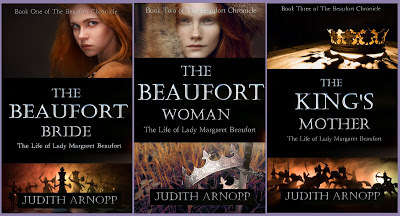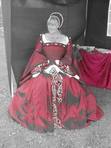Judith Arnopp's Blog, page 27
February 3, 2021
Romance Author Rachael Thomas Flying Solo
 Rachael Thomas was a finalist in Harlequin’s
So You Think You Can Write
competition in 2013 and her entry went on to be her debut book with Harlequin/Mills and Boon.
A Deal Before the Altar
was published in October 2014, became an Amazon best seller. Now Rachael’s titles have been published around the world and in many languages, offering fans of contemporary romance, fantasy and escapism with alpha heroes, strong heroines, glamorous settings and that all important happy ever after ending.
Rachael Thomas was a finalist in Harlequin’s
So You Think You Can Write
competition in 2013 and her entry went on to be her debut book with Harlequin/Mills and Boon.
A Deal Before the Altar
was published in October 2014, became an Amazon best seller. Now Rachael’s titles have been published around the world and in many languages, offering fans of contemporary romance, fantasy and escapism with alpha heroes, strong heroines, glamorous settings and that all important happy ever after ending.Her first self-published title, The Greek’s Outrageous Marriage Deal brings all that romance fans want and expect from her books and she is really excited with her new writing adventure.
Rachael lives in Wales, loves walking with her golden retriever, is a keen amateur photographer and enjoys travelling, where she often finds inspiration. She also loves hearing from readers and can be contacted via her website: www.rachaelthomas.co.uk or Twitter @rachaeldthomas
Rachael says, "Some books just have to be written. The characters demand it of the writer, and The Greek’s Outrageous Marriage Deal is such a book.
It’s also my first self-published book after seven years and sixteen books writing for Mills and Boon, I am now flying solo and enjoying it!"

The Greek’s Outrageous Marriage Deal
A deal to reclaim his wife…
Becomes so much more!
When Athena returns to their marital home in Crete, billionaire Kostas Kyriakou seizes the opportunity to reunite with his wife and have an heir for the empire he has created from nothing. It’s the only deal he’s prepared to consider. After all, heady passion and hot desire had never been lacking in their short marriage.
Athena has promised her father, who is again battling illness, that she will return to Athens with her estranged husband. Seeing the man she’d loved so completely, and hearing his outrageous demands to have his child, forces her to face all the pain and heartache of losing her mother as a young girl.
Time together, acting out a marriage reunited, brings back all that explosive passion, but can they truly share who they are this time and mend the marriage for real?
Buy links
You can follow Rachael on Social Media
January 24, 2021
She Sees Ghosts by David Fitz-Gerald


David Fitz-Gerald writes fiction that is grounded in history and soars with the spirits. Dave enjoys getting lost in the settings he imagines and spending time with the characters he creates. Writing historical fiction is like making paintings of the past. He loves to weave fact and fiction together, stirring in action, adventure, romance, and a heavy dose of the supernatural with the hope of transporting the reader to another time and place. He is an Adirondack 46-er, which means that he has hiked all of the highest peaks in New York State, so it should not be surprising when Dave attempts to glorify hikers as swashbuckling superheroes in his writing. She Sees Ghosts―A Story of a Woman Who Rescues Lost Souls is the next instalment in the Adirondack Spirit Series.
She Sees Ghosts―The Story of a Woman Who Rescues Lost Souls
Part of the Adirondack Spirit Series
by David Fitz-Gerald
Publication Date: October 25, 2020
Publisher: Outskirts Press
Page Length: 270 pages
Genre Historical/Supernatural
A blazing fire killed her family and devoured her home. A vengeful demon haunted her. Ghosts of the Revolutionary War needed help that only she could provide. A young woman languished, desperate to survive, and teetered on the edge of sanity.
Mehitable grew up in a freshly tamed town, carved from the primeval forest. Family, friends, and working at the mercantile filled her days and warmed her heart. For Mehitable, life was simple and safe, until tragedy struck. When her family perished in their burning home, she retreated into a world of her own making.
As a young girl, she had seen glimmers, glimpses, and flickers of the spirit world. She closed her eyes. She turned her back. She ignored the apparitions that she never spoke of, desperately hoping they would leave her in peace. She was mistaken.
Grief-stricken, Mehitable withdrew from the human world. Ghosts were everywhere. They became bolder. She could no longer turn her back on the spirit world. Her friends feared for her survival. Nobody understood her. She would have to find her own way.
Fans of TV’s Ghost Whisperer and Long Island Medium will especially love She Sees Ghosts. This historical novel features memorable characters and delivers bone-tingling, spine chilling goosebumps. It stands on its own and it is the next installment in the Adirondack Spirit Series by the award-winning author of Wanders Far―An Unlikely Hero’s Journey. David Fitz-Gerald delivers a historical novel with a bittersweet ending that you won’t see coming.
Would she save the spirits’ souls, or would they save her? Only time would tell.
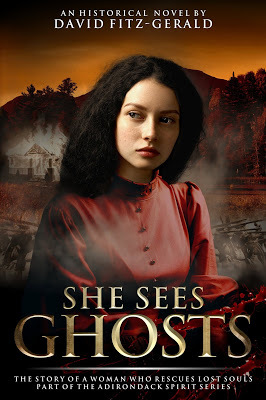
Read an excerpt
At the end of Perry’s snare-trail there were two large boulders, side by side in the woods. They decided to take a break before returning home. They sat facing each other on the rocks and talked about many things. When Perry had finally finished talking about Aurilla, at least for that moment, Mehitable decided she had something confidential that she would like to share as well. She said, “Perry, I want to tell you something I’ve never told anyone before. Do you promise to keep it a secret?”
Perry turned his head slightly and twisted his face in confusion. Then he nodded his head earnestly, agreeing to keep her confidence.
Mehitable put her hands on her kneecaps, leaned forward, and whispered loudly, “Sometimes I think I can see ghosts.” Then she nodded, as if to confirm all the questions that might be asked. The questions came nevertheless.
“Ghosts? Like the Holy Spirit? Like dead people?” Perry asked excitedly.
Mehitable held her index finger up to her lips, reminding him that she would like him to keep such information to himself. Of course, there wasn’t anyone within the sound of her voice. It was the first time she had ever mentioned it out loud.
Perry asked what the ghosts looked like, and whether they were scary.
“Most of the time ’tis like a flash. A quick flicker of movement I see from the corner of my eye. Like a mouse scampering along the base of a wall, gone from sight before you fully realize what you’ve seen.” She shuddered at the thought of seeing a mouse, something she found more unpleasant than ghosts. “Sometimes ’tis like fog in the shape of a person. If I look at it, it starts to come into focus, so that I can see what the person looked like. Usually I just close my eyes or look away.”
Perry asked, “Have you always seen the ghosts?”
Mehitable placed her right hand on her cheek, and looked off into the woods, as if she might find the answer to his question in the forest. “I guess I have always seen them. I have always had the good sense to look away. Maybe the spirits knew I was afraid. Since I started working at the store, I have been seeing them more and more. The ghosts no longer seem content to be ignored. They don’t seem to care that I wish they’d stay away.” She looked at her brother having admitted her fear. She nervously bit her lower lip, and a wrinkle of worry dashed across her forehead.
Perry tried to lighten the moment by joking, “If I ever die, I’ll come back and haunt you. You best not be afraid of me!”
Mehitable laughed and flung a woolen mitten at her brother’s face. She was glad to have shared her secret, and she was glad the conversation was over. She thought, perhaps, that having given voice to her concern, the ghosts would refrain from showing themselves to her in the future.
Watch a trailer here:
Buy Links: Amazon
Find David on Social Media
Website • Twitter • Facebook • Instagram

January 19, 2021
Introducing The Orphan Train Saga by Sherry A. Burton
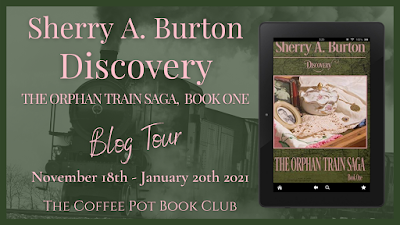
 Born in Kentucky, Sherry got her start writing by pledging to write a happy ending to a good friend who was going through some really tough times. The story surprised her by taking over and practically writing itself.What started off as a way to make her friend smile started her on a journey that would forever change her life. Sherry readily admits to hearing voices and is convinced that being married to her best friend for thirty-eight plus years goes a long way in helping her write happy-ever-afters. Sherry is the author of The Orphan Train Saga novels, a planned eighteen book historical fiction saga that revolves around the historic orphan trains. books in the safe include Discovery, Shamelss, Treachery and Guardian. Loyal, the fifth in the saga, is expected to release summer of 2021. Sherry resides in Michigan and spends most of her time writing from her home office, travelling to book signing events and giving lectures on the Orphan Trains
Born in Kentucky, Sherry got her start writing by pledging to write a happy ending to a good friend who was going through some really tough times. The story surprised her by taking over and practically writing itself.What started off as a way to make her friend smile started her on a journey that would forever change her life. Sherry readily admits to hearing voices and is convinced that being married to her best friend for thirty-eight plus years goes a long way in helping her write happy-ever-afters. Sherry is the author of The Orphan Train Saga novels, a planned eighteen book historical fiction saga that revolves around the historic orphan trains. books in the safe include Discovery, Shamelss, Treachery and Guardian. Loyal, the fifth in the saga, is expected to release summer of 2021. Sherry resides in Michigan and spends most of her time writing from her home office, travelling to book signing events and giving lectures on the Orphan Trains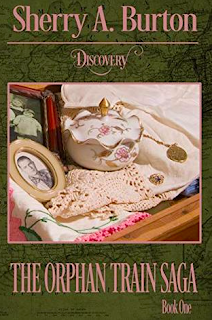
Discovery: The Orphan Train Saga Book One
By Sherry A. Burton
While most use their summer breaks for pleasure, third grade teacher Cindy Moore is using her summer vacation to tie up some loose ends concerning her grandmother’s estate. When Cindy enters the storage unit that holds her grandmother’s belongings, she is merely looking for items she can sell to recoup some of the rental fees she’s spent paying for the unit.
Instead, what she finds are secrets her grandmother has taken to the grave with her. The more Cindy uncovers, the more she wants to know. Why was her grandmother abandoned by her own mother? Why hadn’t she told Cindy she’d lived in an orphanage? And how come her grandmother never mentioned she’d made history as one of the children who rode the Orphan Trains?
Join Cindy as she uncovers her grandmother’s hidden past and discovers the life that stole her grandmother’s love.
Amazon UK • Amazon US • Barnes and Noble
Website • Twitter • Facebook • Instagram • Pinterest • Goodreads

January 12, 2021
A Rooster for Asklepios
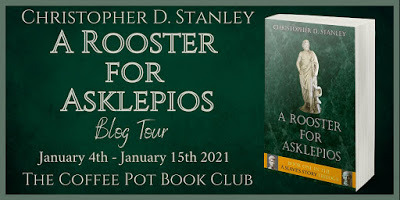
A Rooster for Asklepios
Marcus, a slave in the household of Lucius Coelius Felix, enjoys a better life than most slaves (and many free citizens) as the secretary and accountant of a wealthy aristocrat. His master is rising in the civic life of the Roman colony of Antioch-near-Pisidia (central Turkey), and his responsibilities and income are growing as well. If this continues, he could soon earn enough to buy his freedom, set up a small business, and even marry.
Then misfortune strikes, and his master falls into a deep depression that is exacerbated by a nagging illness that his physician is unable to cure. The future looks bleak until the physician receives a dream from the healing god Asklepios calling Lucius to travel hundreds of miles across western Asia Minor to his sanctuary at Pergamon for treatment and, he hopes, a cure.
Accompanied by Marcus and his new wife Selena, Lucius embarks on a long and eventful journey in which both master and slave encounter people and ideas that challenge long-held beliefs about themselves, their society, and the world around them. Values are questioned, loyalties tested, and identities transformed in a story that brings to life a corner of the Roman empire that has been neglected by previous storytellers.
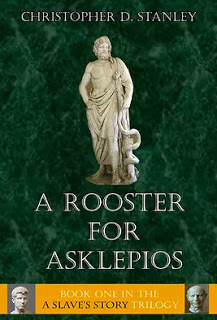
Amazon UK • Amazon US • Amazon CA • Amazon AU
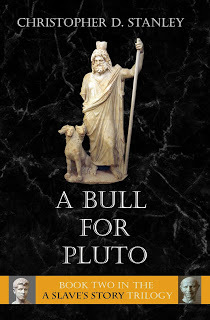
A Bull For Pluto
(A Slave's Story Trilogy, Book 2)
By Christopher D. Stanley
After a lengthy and eventful stay at the sanctuary of Asklepios in Pergamon, the time has come for Lucius and Marcus to return to Antioch. Selena had been sent home earlier when Lucius learned that she was pregnant, and the impending arrival of the winter snows could soon make it impossible for them to reach their destination before the child is born.
To Marcus’s surprise, Lucius announces that he plans to stop for a while in Hierapolis to bask in the healing waters of the city’s renowned hot springs. Here Marcus meets a young woman named Miriam who challenges him to embrace his long-hidden Jewish ancestry. Marcus is torn between his budding love for Miriam and the cost of heeding her advice.
A tragic decision by Lucius seals their fate, as their full attention must now be devoted to preserving Lucius’s life. They reach Antioch in time to learn that Lucius’s son Gaius has failed miserably in his management of the household while his father was away. If Lucius should die, Marcus, Selena, and her unborn child will be at the mercy of this tyrant. To fend off this danger, Lucius must tell Marcus the full truth about his past, a truth that will ensure Marcus's future at the cost of his master's honor. Can he bring himself to act before his inevitable end?
Amazon UK • Amazon US • Amazon CA • Amazon AU
Praise for A Rooster for Asklepios and A Bull For Pluto
"This compelling and enjoyable story offers the reader a superb 'insider' view of life in the first-century Greco-Roman world. I enjoyed traipsing around Anatolia with Lucius and Marcus!"
-Dr. Terence Donaldson, Academic Dean and Professor of New Testament, Wycliffe College, Canada
"The realism of this story reflects the author's deep first-hand knowledge of the landscape and culture where the narrative takes place."
-Dr. Mark Wilson, Director, Asia Minor Research Center, Antalya, Turkey
"This well-researched book really brings the Roman world to life!"
-Dr. Alanna Nobbs, Professor of Ancient History, Macquarie University, Australia
"The amount of research, imagination, and effort involved in crafting this story earned my admiration, and stirred my curiosity, too."
Dr. Mark Nanos, Lecturer, University of Kansas, USA
Si
ckness and Health Care in the Roman WorldHealth conditions and sanitation practices in Greek and Roman cities were vastly inferior to our own, producing serious health problems and short life expectancies (by modern standards) for the bulk of their citizenry. Few authors of Roman historical fiction, however, choose to show their readers this side of ancient life.
By contrast, matters of sickness and health play a central role in my two new historical novels, A Rooster for Asklepios and A Bull for Pluto. A brief overview of the Roman health care system will provide some historical background for readers who are considering purchasing the books.
The Banality of Sickness
In Greek and Roman cities, very few people enjoyed what we would call a “comfortable middle-class lifestyle.” Income and wealth gaps were huge, and everyone except the wealthy elites and those who served them lived on the cutting edge of survival. Malnutrition was a constant threat, especially in times of famine. Sanitation was poor, even in the larger cities that benefited from Roman sewers, and waste-borne diseases were common. Public baths exposed bathers to all sorts of communicable diseases, while periodic floods spread germs over low-lying areas near bodies of water. Those at the lower end of the socioeconomic spectrum lived in dirty, crowded rooms on the upper floors of tenement buildings or in dank cellars, while the poorest residents slept in the open air on fetid sidewalks among disease-ridden pests.
Contagious illnesses spread rapidly under such conditions. At least half of all children died before their fifth birthday, and the average age of death for those who reached adulthood was around 40 for men and 35 for women. (The figure is lower for women because so many died while giving birth.) Among the poor, it would have been unusual for children to grow up with living grandparents.
Even the wealthy, however, were not immune from the threat of sickness. Unlike modern cities where the rich live in their own neighborhoods apart from the poor, people of every social level lived closely together in Greek and Roman cities. Any disease that struck the poor was likely to affect the rich as well unless they were able to escape in time to their farms in the neighboring countryside. The wealthy did enjoy healthier diets and better means of tending to their bodies, including regular exercise at the local gymnasium, and they could always afford the fees of a physician when they needed one.
But sickness and death remained a constant threat even for those at the top of the social pyramid. Wealthy citizens who had good genes, healthy lifestyles, and an ample supply of luck might live into their 60s or even 70s, but few would have reached their 80s, and most who did would have been seriously debilitated by that time.
Modes of Health Care
Every society in human history has developed mechanisms for tending and curing the sick. In modern Western societies, the bulk of the care is provided by a science-based medical system that has proved so effective that most people regard it as the default mode of treatment. In the ancient world, by contrast, medicine was only one of several competing systems of care.
For most people the first resort was self-care within the family. Common remedies included eating (or avoiding) certain types of food, taking home-made medicines, heating or cooling the body, exercise, and rest. Many treatments included the recitation of spells or incantations that were believed to enhance their effectiveness. Virtually everyone wore some type of amulet—items or substances that were thought to protect the wearer from harm—on a daily basis, and more amulets could be added to treat specific conditions. Specialists in such “magical” cures (often women) were available to assist with more stubborn cases.
Equally common were religious modes of treatment. Prayers and vows were offered to various deities to protect the household and heal the sick as part of the regular morning ritual that marked the beginning of every Roman’s day. In more serious cases, animal sacrifices and other types of offerings might be presented at the temple of a healing deity, especially the Greek god Asklepios (or Aesculapius, as he was known by the Romans). If this proved insufficient, those who could afford it might travel to a regional healing sanctuary in hopes of being visited by Asklepios in a dream either to heal them or to prescribe a treatment that would do the job.
A third mode of care was provided by physicians. Physicians occupied a fairly low position in the Greco-Roman social order—most people regarded them as more like skilled craftsmen than professionals. Many were slaves who had been bought by wealthy citizens to provide care for their households or by civic authorities to treat the general public. Some plied their skills at healing sanctuaries, either as slaves who were owned by the resident deity or as freedmen, like the physician Heracleion in my novels. Most came from Greek or native stock, even those who cared for Romans.
Medical training in the Greek world consisted of working as an apprentice to an established physician, not attending a medical school to earn a degree. Medical treatises were few and far between, so the bulk of a physician’s education came from observing, asking questions, and applying treatments to live patients. Here and there a group of medical trainees might live and study together at a healing sanctuary like the ones at Pergamon and Carura that appear in my novels, but even here their training did not include a formal curriculum or classrooms as in a modern school.
Greek medical theory was based primarily on philosophical speculation rather than scientific inquiry. Greeks viewed the body as a mixture of the four basic elements of the universe: earth, air, water, and fire. These elements were represented in the body by four “humors” or fluids that circulated throughout the body: blood, phlegm, yellow bile, and black bile. In a healthy body, the humors were properly balanced and the organs worked as designed. Sickness resulted when the humors were thrown out of balance by some type of disorder. The task of the physician was not to diagnose the cause of the imbalance but to prescribe treatments that would restore the balance of the humors, including heating, cooling, diet, medications, exercise, purging, and bleeding.
Needless to say, few of these treatments have any support from modern science. But a general awareness of how people viewed and treated illness in the ancient world will enable readers to better understand the various types of healing that Lucius pursues in the course of my stories.
Author Bio
Christopher D. Stanley is a professor at St. Bonaventure University who studies the social and religious history of Greco-Roman world, with special attention to early Christianity and Judaism. He has written or edited six books and dozens of professional articles on the subject and presents papers regularly at conferences around the world. The trilogy A Slaves Story, which grew out of historical research on first-century Asia Minor, is his first work of fiction. He is currently working on an academic book that explores healing practices in the Greco-Roman world, a subject that plays a vital role in this series.
Connect with Christopher:
Website • Facebook • Twitter • Instagram • Goodreads
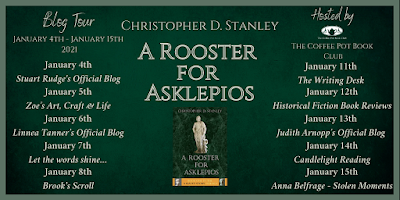
January 5, 2021
Introducing Virginia Crow as part of The Coffee Pot Book Club Book Tour

As part of The Coffee Pot Book Club Tour I am delighted to welcome Virginia Crow to the blog.
 Virginia grew up in Orkney, using the breath-taking scenery to fuel her imagination and the writing fire within her. Her favourite genres to write are fantasy and historical fiction, sometimes mixing the two together such as her newly-published book "Caledon". She enjoys swashbuckling stories such as the Three Musketeers by Alexandre Dumas and is still waiting for a screen adaption that lives up to the book! When she's not writing, Virginia is usually to be found teaching music, and obtained her MLitt in "History of the Highlands and Islands" last year. She believes wholeheartedly in the power of music, especially as a tool of inspiration. She also helps out with the John O'Groats Book Festival which is celebrating its 3rd year this April. She now lives in the far flung corner of Scotland, soaking in inspiration from the rugged cliffs and miles of sandy beaches. She loves cheese, music and films, but hates mushrooms.
Virginia grew up in Orkney, using the breath-taking scenery to fuel her imagination and the writing fire within her. Her favourite genres to write are fantasy and historical fiction, sometimes mixing the two together such as her newly-published book "Caledon". She enjoys swashbuckling stories such as the Three Musketeers by Alexandre Dumas and is still waiting for a screen adaption that lives up to the book! When she's not writing, Virginia is usually to be found teaching music, and obtained her MLitt in "History of the Highlands and Islands" last year. She believes wholeheartedly in the power of music, especially as a tool of inspiration. She also helps out with the John O'Groats Book Festival which is celebrating its 3rd year this April. She now lives in the far flung corner of Scotland, soaking in inspiration from the rugged cliffs and miles of sandy beaches. She loves cheese, music and films, but hates mushrooms.
Book Title: Beneath Black Clouds and White
Author: Virginia Crow
Publication Date: 11th April 2019
Publisher: Crowvus
Print Length: 637 Pages
Genre: Historical Fiction/Military Fiction/Family Saga
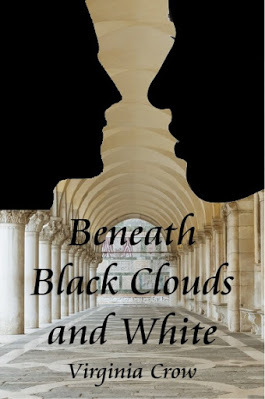
Blurb
Despite adoring his family and enjoying frequenting gaming tables, Captain Josiah Tenterchilt’s true love is the British Army and he is committed to his duty. As such, he does not hesitate to answer the army’s call when King Louis XVI of France is executed.
Accompanied by his wife to Flanders, Josiah finds his path crosses with a man who could not be more different from him: an apprentice surgeon named Henry Fotherby. As these two men pursue their own actions, fate and the careful connivance of a mysterious individual will push them together for the rest of their lives.
But it is a tumultuous time, and the French revolutionaries are not the only ones who pose a threat. The two gentlemen must find their place in a world where the constraints of social class are inescapable, and ‘slavery or abolition’ are the words on everyone’s lips.
Beneath Black Clouds and White is the prequel to Day's Dying Glory, which was published by Crowvus in April 2017.
An excerpt
Now, all three girls watched excitedly as a large joint of beef, tureens of vegetables and the plate that housed the plum pudding were brought through from the kitchens downstairs. Arabella brushed a loose stand of hair from her face as she indicated to one of the footmen the food she would like. She was a lady in miniature, having learnt a great deal from her mother in her eight years, studying each movement that she made and trying to learn from the answers and instruction she gave. This great house would one day be her own, Arabella knew, and she wished to be prepared for such a day whenever it might appear. Imogen sat with her hands on her lap as she knew she should, having been taught ready for her seventh birthday next year, but her eyes sparkled as she took in the splendour of the spread before her. Catherine covered her mouth trying to hide the excited smile she felt creep across her face and she giggled into her fingers as her father stood to carve the meat. Being only four she had a long time to wait before she would be able to share this experience daily with her parents, and to be given an opportunity midweek seemed almost as exciting as the gifts waiting in the Drawing Room.
Captain Tenterchilt, who sat at the head of the table, looked at his gathered family and smiled slightly to himself. Elizabeth, whose eyes never strayed from her husband’s, followed his gaze and felt a similar smile catch her own features as she took his hand in her own. Arabella watched on from the other side of the table, unsure whether she should take her father’s other hand but deciding against it.
“Catherine,” Imogen hissed as her younger sister picked up one of the potatoes in her hand.
“It is alright, Imogen,” her father said gently, while Elizabeth helped her youngest daughter with her cutlery. Generally, their mother would not do such a thing, but Christmas brought great acceptance and leniency within the family hierarchy.
“My dear ladies,” Captain Tenterchilt said, rising to his feet. “A very happy Christmas to you all. I shall not make a long toast, or Cat may not be able to contain her excitement.” Imogen watched as her mother frowned slightly, but her father continued. “But with the events that brew overseas this might be our last Christmas together for a time.”
“Josiah, please,” Elizabeth whispered as Imogen’s eyes filled with tears.
“War is in a man’s nature, Elizabeth,” he replied, looking around the table. Imogen kept her eyes fixed on her father as he continued speaking.
“I do not mean that I shall die, my dears, only that war does not know the holy days and festivals which we observe.”
“But, Papa,” Arabella whispered. “You have missed our last two Christmases.”
“It is the price military men must pay, my dears.”
“I hope that my Christmas miracle might be that you are returned to us for next Christmas, Papa,” Imogen whispered with great earnest. Catherine looked across at her father and nodded, unable to say anything with her mouth full of plum pudding.
“You could not wait, my little Cat,” Josiah smiled across at his youngest daughter who shook her head, giggling into her hands once more.
“Her name is Catherine,” Elizabeth whispered, looking at her own plate but seeing nothing. She loved Josiah so overwhelmingly, but she had been forced to acknowledge that, while she held the highest position in his heart, he still belonged very much to the army. Her husband had only just returned to her from his exploits in India, where he had fought in the Kingdom of Mysore. That he was already planning and anticipating his return to conflict left a bitter taste.
“Then, here is a health to my beautiful ladies,” Josiah continued, lifting his glass to them all. Arabella and Imogen copied him while Elizabeth begrudgingly lifted her glass and encouraged young Catherine to do the same. “Merry Christmas, my dears.”
“Merry Christmas, Papa,” the three girls chimed as one before Elizabeth set her own glass on the table, untouched. At once the children began eating and their mother watched as the three of them, with varying manners, enjoyed their dinner. She tried to recall the celebration of the day, and smiled at each one of her family, but could not bring herself to engage in conversation.
Buy Links:
Amazon UK • Amazon US • Smashwords • Kobo • Barnes and Noble
Connect with Virginia:
Website • Twitter • Facebook • Instagram • Publisher

December 30, 2020
She Sees Ghosts by David Fitz-Gerald
 Fans of TV’s Ghost Whisperer and Long Island Medium will especially love
She Sees Ghosts
. This historical novel features memorable characters and delivers bone-tingling, spine chilling goosebumps. It stands on its own and it is the next installment in the Adirondack Spirit Series by the award-winning author of Wanders Far―
An Unlikely Hero’s Journey
. David Fitz-Gerald delivers a historical novel with a bittersweet ending that you won’t see coming.
Fans of TV’s Ghost Whisperer and Long Island Medium will especially love
She Sees Ghosts
. This historical novel features memorable characters and delivers bone-tingling, spine chilling goosebumps. It stands on its own and it is the next installment in the Adirondack Spirit Series by the award-winning author of Wanders Far―
An Unlikely Hero’s Journey
. David Fitz-Gerald delivers a historical novel with a bittersweet ending that you won’t see coming.Would she save the spirits’ souls, or would they save her? Only time would tell.
Watch the Trailer Here:
She Sees Ghosts is FREE on #Kindle for a Limited Time
Amazon

David Fitz-Gerald writes fiction that is grounded in history and soars with the spirits. Dave enjoys getting lost in the settings he imagines and spending time with the characters he creates. Writing historical fiction is like making paintings of the past. He loves to weave fact and fiction together, stirring in action, adventure, romance, and a heavy dose of the supernatural with the hope of transporting the reader to another time and place. He is an Adirondack 46-er, which means that he has hiked all of the highest peaks in New York State, so it should not be surprising when Dave attempts to glorify hikers as swashbuckling superheroes in his writing. She Sees Ghosts―A Story of a Woman Who Rescues Lost Souls is the next instalment in the Adirondack Spirit Series.
***
A blazing fire killed her family and devoured her home. A vengeful demon haunted her. Ghosts of the Revolutionary War needed help that only she could provide. A young woman languished, desperate to survive, and teetered on the edge of sanity.
Mehitable grew up in a freshly tamed town, carved from the primeval forest. Family, friends, and working at the mercantile filled her days and warmed her heart. For Mehitable, life was simple and safe, until tragedy struck. When her family perished in their burning home, she retreated into a world of her own making.
As a young girl, she had seen glimmers, glimpses, and flickers of the spirit world. She closed her eyes. She turned her back. She ignored the apparitions that she never spoke of, desperately hoping they would leave her in peace. She was mistaken.
Grief-stricken, Mehitable withdrew from the human world. Ghosts were everywhere. They became bolder. She could no longer turn her back on the spirit world. Her friends feared for her survival. Nobody understood her. She would have to find her own way.
Fans of TV’s Ghost Whisperer and Long Island Medium will especially love She Sees Ghosts. This historical novel features memorable characters and delivers bone-tingling, spine chilling goosebumps. It stands on its own and it is the next installment in the Adirondack Spirit Series by the award-winning author of Wanders Far―An Unlikely Hero’s Journey. David Fitz-Gerald delivers a historical novel with a bittersweet ending that you won’t see coming.
Would she save the spirits’ souls, or would they save her? Only time would tell.
Social Media Links:
Website • Twitter • Facebook • Instagram

December 17, 2020
Sneak preview of Bright Helm, Book four of The Byrthnoth Chronicles by Christine Hancock
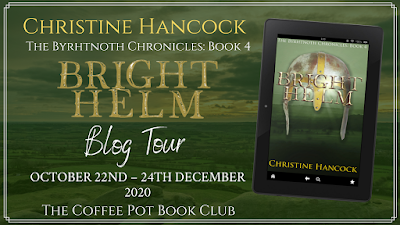
Today, as part of The Coffee Pot Book Club Tour, I am delighted to bring you a sneak preview of Bright Helm, Book four of The Byrthnoth Chronicles by Christine Hancock

Christine Hancock was born in Essex and moved to Rugby, Warwickshire when she married. She a husband, two sons and two lovely grandchildren.
She is a long term family historian, leader of the local history group and town guide.
Christine had never thought of becoming an author - She just wanted to write about some her ancestors. In 2013 she joined a writing class. The class turned out to be about writing fiction. Before she knew it, she was writing a novel.
Byrhtnoth was a real warrior who died in the 991 Battle of Maldon, made famous by the Anglo-Saxon poem of that name. Growing up in Essex, Christine visited Maldon often, and attended the 1000 year anniversary of the battle in 1991.
She wanted to find out what made Byrhtnoth such a famous warrior.
She finished the book but discovered it had become a series - how long, she has yet to find out.
Book Title: Bright Helm
Publication Date: 15th October 2020
Publisher: Madder Press
Series: The Byrhtnoth Chronicles
Genre: Historical Fiction
The Byrhtnoth Chronicles: Book 4
By Christine Hancock
Separated by anger and unanswered questions, Byrhtnoth and Saewynn are brought together by a tragic death.
Re-united, they set out on an epic voyage to discover the final truth about his father.
The journey takes them far to the north, to Orkney, swathed in the mists of treachery, and to Dublin’s slave markets where Byrhtnoth faces a fateful decision.
How far will he go, to save those he cares for?
First Chapter
Last summer, I died. I remember it vividly. The exhaustion of a hard-fought battle, the despair as my axe slipped from my hand in the torrential rain. I can still feel the impact of my enemy’s weapon as it struck my helmet, but strangely no pain. I still taste the mud that filled my mouth as my body fell to the ground. I even hear the triumphant shout of victory and the screams as other men died. There is an overwhelming smell of blood, and if I close my eyes, I can see it, my blood, soaking into the sodden soil. And then? Nothing.
I woke up. Time had passed. When I died it was the height of summer; now it is the depths of winter, and I am home, lying in my own bed. How did I get here? They say I survived the battle, how? They have shown me my ruined helmet; how could anyone survive that blow? I raise my hand to my head; the hair is freshly grown, and beneath the stubble is a scar.
What happened in the time between my death and my awakening? They say that someone rescued me. Who? I entered the river which washed me far downstream. People not knowing who I was cared for me. Why? Who were they? Then my wife came with the others and rescued me, brought me back by ship. They thought I would die. I didn’t.
It is so difficult, not knowing what happened. Sometimes a memory floats just out of reach. When I try to catch it, it disappears. Was it even there?
Then there are the dreams: the dream in which I kill my father. I am there and yet I cannot see, blinded by a bright shining light. My hands are around a man’s neck. I know it is my father and that I hate him, hate him more than I have hated anyone. Because he lied to me? My hands tighten. I feel the brush of a beard and the heaving muscles of his neck. I smell his breath, sour and stinking of fish. I hate fish. Fingers tear at mine, but I am stronger. There are voices, shouting, I cannot hear the words. He fights for breath, horrible rasping gasps. I lift him, feet off the ground. He is smaller than me; I thought he would be taller. He kicks feebly and then it ceases. I drop the dead weight and wake, exhausted and sweating.
One night I woke to find my hands about my wife’s neck. Although too weak to cause harm, I have banished her from our bed. I am lonely, but I cannot risk her life. I tell them I can’t remember the dream, if it is a dream. They think it is a memory of the battle. Is it a memory? It can’t be, how could I meet my father? Why would I want to kill him? Is it a prophecy, a warning of what is to come? If I meet my father, am I fated to murder him? Always I have desired to find the truth about him; perhaps it is better not to take that risk.
I resist any talk of what will happen when I recover. I am afraid. What might I do when my strength returns? Perhaps the dream will have faded by then, and everything will be as it used to be.
Or it might get worse. There is another dream, a feeling. It comes at night and sometimes during the day. I cannot see, I cannot move. Something imprisons me, someone, and then he laughs.
Buy Links:
Connect with Christine:
Website: https://byrhtnoth.com
Twitter: https://twitter.com/YoungByrhtnoth
Facebook: https://www.facebook.com/ByrhtnothAuthor
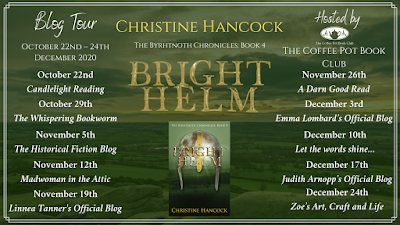
December 2, 2020
Anne Boleyn’s Education and Life at the French Court
 Olivia Longueville has always loved literature and fiction, and she is passionate about historical research, genealogy, and the arts. She has several degrees in finance & general management from London Business School (LBS) and other universities. At present, she helps her father run the family business. During her first trip to France at the age of ten, Olivia had a life-changing epiphany when she visited the magnificent Château de Fontainebleau and toured its library. This truly transformed her life as she realized her passion for books and writing, foreshadowing her future career as a writer. In childhood, she began writing stories and poems in different languages. Loving writing more than anything else in her life, Olivia has resolved to devote her life to creating historical fiction novels. She has a special interest in the history of France and England.
Olivia Longueville has always loved literature and fiction, and she is passionate about historical research, genealogy, and the arts. She has several degrees in finance & general management from London Business School (LBS) and other universities. At present, she helps her father run the family business. During her first trip to France at the age of ten, Olivia had a life-changing epiphany when she visited the magnificent Château de Fontainebleau and toured its library. This truly transformed her life as she realized her passion for books and writing, foreshadowing her future career as a writer. In childhood, she began writing stories and poems in different languages. Loving writing more than anything else in her life, Olivia has resolved to devote her life to creating historical fiction novels. She has a special interest in the history of France and England. ***
In 1522, a young, sophisticated woman arrived at the English court after spending most of her life in two continental courts. Intelligent, educated, and stylish beyond the typical English lady, Anne Boleyn dazzled the court and set herself on a path that would lead to the heights of power before her life was tragically and unjustly cut short.
This article will explore Anne’s education and experiences as a young girl in service to Queen Claude, wife and cousin of the young, flamboyant King François I of France. Anne’s father, Thomas Boleyn, was a successful diplomat who strove to give his youngest daughter the best education possible, and he arranged for her to stay in France, for he likely considered the Tudor court to be behind the more progressive and more cultured continental courts. There are disagreements over Anne’s date of birth, but this debate is beyond the scope of this article. For this article and in my books, I’m assuming that Anne was born circa 1507.

When Anne entered the household of Queen Claude in 1515, the young queen was only 16 years old. Claude had a sister, Princess Renée of France, who was 3 years younger than Anne. Taking into account Anne’s young age, her responsibilities likely centered on providing companionship to Princess Renée while polishing her court manners and skills with the hope of making a respectable marriage. Anne would have also joined the deeply pious Queen Claude and the other maids of honor in prayer several times each day. It is interesting to note that during the reign of Anne’s daughter, Elizabeth I, Princess Renée confirmed to Sir Nicholas Throckmorton (the English ambassador to France) that she had personally known Anne.
Because of her almost annual pregnancies, Claude spent most of her time in confinement at Châteaux d’Amboise and de Blois. Despite the young queen’s sequestered lifestyle, Anne would have been exposed to the rich cultural milieu of the early French Renaissance. Beyond honing her skills in the French language, she would have learned court dances, been instructed in singing and musical instruments, and she would have had first hand experience in seeing and hearing the great works of contemporary artists, musicians, and authors.
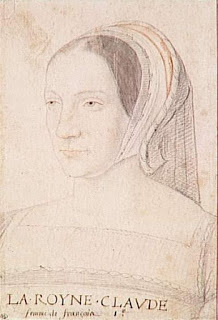
Illuminated manuscripts were of particular interest to Anne. She must have seen Queen Claude’s Book of Hours. A tiny, jewel-like manuscript, it was made for Claude in 1516, and her coat-of-arms appears on 3 different folios. The diminutive size reflected the fashion of the French court at the turn of the 16th century, and it provided the perfect frame for the artist’s characteristically detailed brushstrokes. In this book, there are numerous references to Claude, including abundant royal motifs, mottos, and emblems. Anne’s own illuminated manuscripts, which she ordered years later, have some elements which we see in Claude’s book (currently housed in the Morgan Library & Museum, NYC, USA). For example, one of Anne’s Book of Hours is richly illustrated: the borders of each leaf are painted, front and back, with scenes from the lives of Jesus Christ, the Virgin Mary, and saints.

Queen Claude adored music, especially sacred compositions, and she often invited composers and singers to her chambers to perform for her. Anne must have heard the singing and musical performances of Claudin de Sermisy and Clément Janequin, notable composers of French chansons in the early 16th century. Clément Marot, whose many chansons were put to music by Sermisy, often visited Claude, so Anne would definitely have met him. Therefore, Anne was exposed to a wide range of sacred and secular music, as well as masses, Requiem masses, motets, magnificats (canticles or Songs of Mary), and Lamentations. One manuscript in the collection of the Royal College of Music, England, contains an early 16th-century choir book that includes 39 Latin motets and 3 French chansons by Franco-Flemish composers. It was prepared for Anne Boleyn because one composition depicts a falcon, which Anne used as her badge. The songbook contains chansons of Sermisy, Janequin, and a few others.
Anne’s instruction in the visual delights of fashion would have been focused on those times when she (along with the queen’s other ladies) accompanied Claude to significant events such as the journey to greet a triumphant François after his victory at the Battle of Marignano (1515), the pilgrimage to Saint-Maximin-la-Sainte-Baume (the alleged tomb of Mary Magdalene), and Claude’s coronation at the Basilica of St Denis on the 10th of May 1517.
A particularly infamous event was the Field of the Cloth of Gold in June 1520, just outside Calais. Eric Ives writes about this event:
“She [Claude] wore cloth of silver over an underskirt of cloth of gold and rode in her coronation litter of cloth of silver decorated with friars’ knots in gold, a device which she had taken from her mother. Her ladies rode in three carriages similarly draped in silver and, no doubt, were dressed to match the queen.”
In her early teens at the time, Anne must have been among these ladies. No longer a child, yet not fully a woman, she was likely at an age when dressing in sumptuous French fashions would have not only been memorable, but also influential on the development of her personal style. Her exquisite manners, her majestic allure, and her impeccable style, which she had begun to develop in the Low Courtiers and honed in France, later helped Anne attract the attention of King Henry VIII. Every time she accompanied Queen Claude at festivities, she danced with the grace of a swan. King François is known to have said something that might refer to Anne:
“Venus was blonde, I’ve been told: Now I see that she’s a brunette!”
King François loved everything Italian and aimed to make France the center of an unparalleled artistic revival. From the beginning of his reign, François patronized many illustrious artists such as Andrea del Sarto, Jean Clouet, and many others. An interesting consideration when discussing Anne’s education in France is the speculation that she would have met an elderly Leonardo de Vinci. François and Leonardo developed a close relationship.
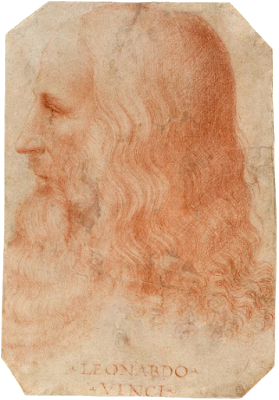
Leonardo da Vinci relocated to France in 1516 and spent his last years there. Leonardo brought to France some of his celebrated works such as the Mona Lisa, Saint Anne, and Saint Jean Baptiste (they are now kept in the Musée du Louvre, Paris, France). As he was an old man suffering from rheumatism, Leonardo painted little, but he still actively worked for his new patron and created elaborate decorations for celebrations and plans for new architectural projects. The Maestro was a scientist, an artist, and a man with diverse interests ahead of his time. His home in France was Château du Clos Luce located close to Château d’Amboise.

As Amboise was one of Queen Claude’s preferred residences, it is highly likely that Anne saw Leonardo da Vinci during festivities where he presented his inventions to the courtiers. Leonardo designed decorations for the christening of the king’s eldest son and heir – Dauphin François, Duke of Brittany – at Amboise on the 25th of April 1519. As one of the queen’s ladies, Anne would have attended this event. Da Vinci’s original automation prepared for celebrations is lost, but the animal was recreated at Château du Clos Luce.
Anne would have witnessed the growing popularity of Italian Renaissance architecture. The towns of Amboise and Blois, which benefited from the court’s presence, became drivers of new cultural and architectural developments. A substantial part of Château d’Amboise was refurbished and decorated with a series of Italian frescoes, tapestries, and paintings depicting foreign cities, courtly love, outdoor activities, mythology, and scenes from chivalrous romances. As the François loved medieval chivalry legends such as ‘Le Morte d'Arthur’ (‘The Death of Arthur’), ‘Lancelot, the Knight of the Cart’ by Chrétien de Troyes, the old Chanson de Roland, and so forth, many expensive tapestries and arrases, depicting such scenes, were either imported from Flanders or produced in France. Anne must have been awestruck from the abundance of mythological decorations and ornaments on fireplaces and furniture.

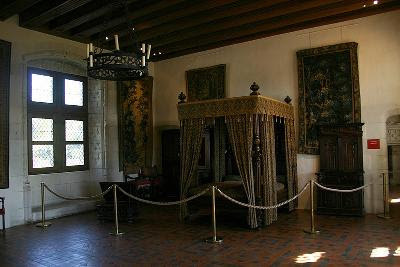
Beginning in 1515, François commissioned the construction of a new wing at Château de Blois in a fusion of Gothic and Renaissance styles. The ruler commanded the Italian architect Domenico da Cortona, called Boccador, to build something spectacular. The most striking feature is the polygonal external staircase tower, decorated with gargoyles, statues in niches, and antiquity-inspired ornamentations, which is admired by modern tourists at Blois. I can imagine Queen Claude with her ladies-in-waiting, Anne among them, climbing this monumental and well-recognizable staircase. Anne must have witnessed the construction works and admired the elegance of the new wing – ‘The François I wing’ – at Blois. The building of Château de Chambord began in 1519 in Sologne, but the works were finished in 1527, after Anne’s departure home. Anne would have seen many architectural changes as they were under construction and some of them were completed, up to her departure for England in 1522.
Another important factor in Anne’s French education was the vast library at Château de Blois. King François had an enthusiasm for reading and book collecting, and he located his magnificent library at Blois, one of Claude’s favorite homes. According to the inventory of 1518, 1,626 manuscripts and printed volumes belonged to the collection. Apart from religious texts, hunting manuals, and romances, many classical texts in Latin were listed. Special agents worked for the monarch across Europe, buying rare books for him, including volumes in Greek and Hebrew. The library included precious and rare manuscripts such as: ‘The Tree of Battles’ (Arbre des Batailles) by Honoré de Bouvet, who had been Charles VI’s councilor; ‘The Bible of Poets” (La Bible des poëtes) by the Picardian poet Évrard de Conty, which had been written in 1401-02; and the mystical treatise ‘The Clock of Wisdom’ (Horloge de Sapience) by Henry Suso. There were also copies of the official Chronicles de France. The library had the original manuscript of ‘The Hundred Tales’ (The Cent Nouvelles Nouvelles), which is a collection of stories that had been narrated by people at the court of Philippe the Good, Duke of Burgundy.
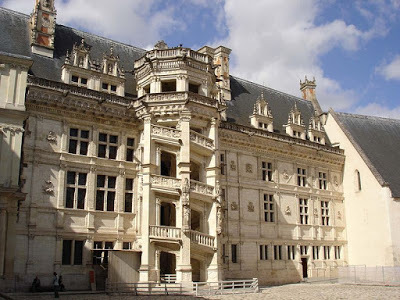
Anne had an immeasurable passion for both reading and knowledge, and it is likely that she was given some level of access to the library at Blois, especially since Queen Claude was said to have been fond of the girl. Without a shadow of a doubt, Anne must have spent quite some time at the magnificent library at Blois when she had free time. Anne also appears to have been a member of Marguerite d’Angoulême’s intellectual circles. Marguerite was the king’s sister, and she wielded surprising influence during his reign. Supporting artists, humanists, evangelicals, and church reformers, Marguerite encouraged intellectuals to mingle and initiated discussions on various themes, for she adored Renaissance humanism and classics.
Marguerite d’Angoulême had a friendly relationship with Queen Claude, and, thus, Anne would have known Marguerite both from her personal visits with Claude and her frequent correspondence with the queen. This would have exposed Anne to new religious ideas and humanism. Thanks to François and Marguerite, Neo-Platonism thrived in France. The humanist Jacques Lefevre d’Étaples translated the works of Plato and a series of Greek treatises ‘The Pseudo-Dionysius’ and ‘Hermes Trismegistus’, dedicating them to Guillaume Briçonnet, who became a leader of the proposed church reform and the Renaissance of humanism in France. Marguerite’s ideas were admired by the Neo-Platonists Étienne Dolet and Bonaventure des Périers, and by the Renaissance French writers Clément Marot and François Rabelais. It was a time when Anne Boleyn had an explosion of intellectual activity.
In 1522, Anne Boleyn left France a unique woman, one who was far more educated than the typical English noblewomen. The Renaissance blossomed in France thanks to King François, Marguerite d’Angoulême, and their mother, Louise de Savoy. England largely remained a cultural backwater at the time, although King Henry VIII’s court was transitioning to a more sophisticated atmosphere. England would eventually become a true Renaissance nation during the reign of Queen Elizabeth I, Anne Boleyn’s daughter. But first, Anne’s refined manners, exotic air, continental style, stellar education, and quick, intelligent mind would make her the brightest star at the English court, dazzling a king and eventually changing the course of history.
Olivia Longueville is the author of several Historical Fiction books. Her novel about Anne Boleyn, Between Two Kings, is available on Kindle and Paperback

Buy it Now UK
Buy it Now - US
Blurb
Anne Boleyn is imprisoned in the Tower of London on false charges of adultery, high treason, and incest on the orders of her husband, King Henry VIII of England. Providence intervenes – she escapes her destined tragedy and leaves England. Unexpectedly, she saves King François I of France, who offers her a foolhardy deal, and Anne secretly marries the French monarch.
With François’ aid, she seeks vengeance against the English king and all those who betrayed her and designed her downfall in England. Henry must face the deadly intrigues of his invisible enemies, while his marital happiness with his third queen, Jane Seymour, is lost and a dreadful tragedy also strikes the king. The course of English and French history hangs in the balance.
From the gloomy Tower of London to the opulent courts of England, France, and Italy, brimming with intrigue and danger – Anne Boleyn survives, becoming stronger and wiser, and fights to prove her innocence. Her hatred of Henry is inextricably woven into her existence.
Olivia’s social media profiles:
Personal website: www.olivialongueville.com/
Project website: www.angevinworld.com/
Twitter: @O_Longueville
Facebook: www.facebook.com/OliviaLongueville/
Tumblr: www.olivia-longueville.tumblr.com/
Photos from https://commons.wikimedia.org/
November 24, 2020
buy nowWe at the Historical Fictioneers are very excited ...
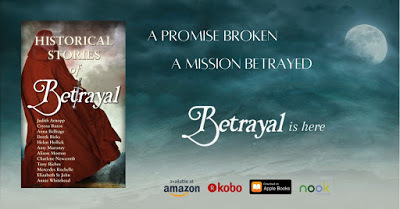 buy now
buy nowWe at the Historical Fictioneers are very excited by the success of our anthology of short stories, Betrayal. It is a FREE download on all platforms brought to you by twelve accomplished writers who explore these historical yet timeless challenges.
AD455—Roman leader Ambrosius is caught in a whirlpool of shifting allegiances
AD940—Alyeva and cleric Dunstan navigate the dangers of the Anglo Saxon court
1185—Knight Stephan fights for comradeship, duty, and honour. But what about love?
1330—The powerful Edmund of Kent enters a tangled web of intrigue
1403—Thomas Percy must decide whether to betray his sovereign or his family
1457—Estelle is invited to the King of Cyprus’s court, but deception awaits
1483—Has Elysabeth made the right decision to bring Prince Edward to London?
1484—Margaret Beaufort contemplates the path to treason
1577—Francis Drake contends with disloyalty at sea
1650—Can James Hart, Royalist highwayman, stop a nemesis destroying his friend?
1718—Pirate Annie Bonny, her lover Calico Jack, and a pirate hunter. Who will win?
1849/present—Carina must discover her ancestor’s betrayer in Italy or face ruin.
My story, House Arrest is set in the reign of Richard III while Margaret Beaufort is imprisoned in her home for treason. Margaret's life is the original roller coaster as she negotiates the perils of the war of the roses. The Beaufort Bride covers her early years at her mother's house, Bletsoe, her time in Wales as the child bride of Edmund Tudor and the birth of her son, Henry Tudor. As part of the BETRAYAL celebrations I am offering the kindle download of The Beaufort Bride for 99p!
The Beaufort Bride - Book one of The Beaufort Chronicle
As King Henry VI slips into insanity and the realm of England teeters on the brink of civil war, a child is married to the mad king's brother. Edmund Tudor, Earl of Richmond, takes his child bride into Wales where she discovers a land of strife and strangers.
At Caldicot Castle and Lamphey Palace Margaret must put aside childhood, acquire the dignity of a Countess and, despite her tender years, produce Richmond with a son and heir.
While Edmund battles to restore the king's peace, Margaret quietly supports his quest; but it is a quest fraught with danger.
As the friction between York and Lancaster intensifies 14-year-old Margaret, now widowed, turns for protection to her brother-in-law, Jasper Tudor. At his stronghold in Pembroke, two months after her husband's death, Margaret gives birth to a son whom she names Henry, after her cousin the king.
Margaret is small of stature but her tiny frame conceals a fierce and loyal heart and a determination that will not falter until her son's destiny as the king of England is secured.
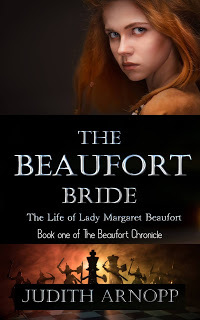 mybook.to/thebeaufortbride
mybook.to/thebeaufortbrideIn the following excerpt from The Beaufort Bride, Margaret is six months pregnant and has just had word that her husband has been imprisoned in Carmarthen castle and likely to die of pestilence. She persuades Jasper to take her to him.
Another long road. Another jolting, disheartening journey in the litter. Try as I might to persuade him, Jasper is unbending.
“You will ride in the litter or not at all,” he says, attempting to soften his harsh words with a quick smile. Pouting like an unruly child, I gather my cloak about me and clamber into the detested conveyance. I sit bolt upright, simmering with anger for as long as I can bear to. Myfanwy, moonstruck by Jasper’s return, smiles an apology for my behaviour and tries to soothe me.
“The journey will not be so long this time,” she says, “and Jasper is only thinking of your safety, and that of the babe.” She nods toward the dome of my belly and instinctively I put a hand on it, the contact imperceptibly softening my mood.
“I know.” Full of resentment, I look out beyond the looped-back curtain. Mercifully the weather is dry; a chilly bright day, with the sun reflecting on the puddles left by the last few weeks of rain. The blue skies are a teasing reminder of the summer so recently departed. Tomorrow, it will rain again.
Jasper rides at the head of the column. I watch his upright figure, notice how his head continually moves from left to right as he scans the horizon for signs of trouble. He is uneasy, not convinced of York’s promise of safe passage, and his discomfort unnerves me too.
Where the terrain allows, we follow the serpentine trail of the River Tywi, but every so often, to avoid marshy terrain, we are forced to higher ground. As we pass close to Grey Friars, the waterlogged fields about the river are scattered with sheep. At our approach, they throw up their heads in alarm and abandon their grazing to hurry from our path. Myfanwy laughs.
“Look at them. They look like beggars with their grubby woollen fleeces hanging from their backs.”
I smile, but I do not care about sheep. In the distance, I have spied the town gate and beyond it the towers of Carmarthen Castle standing proudly above a loop at the river crossing.
I sit up straighter and try to see ahead, as if expecting Edmund to be waving a greeting from the battlement. But he does not know I am coming; I will be the last person he expects to see.
I watch Jasper ride toward the town gate. He leans from his saddle and exchanges words with the gatekeeper. He takes off his helmet and turns toward me, the wind tussling his hair which, I notice with a sudden pang, is the exact same shade as Edmund’s. His brow is creased and, noting his dour expression, I sense more trouble. My heart sinks as, after a further exchange of words, he turns his horse and rides back to the litter.
He slides from his horse.
“Margaret …” He hesitates, pulls a face and lets out a long breath. “There is pestilence here. I cannot let you travel farther. It isn’t safe.”
A surge of anger such as I have never known consumes me; I can feel it rushing uncontrollably through my body, gathering in my head until I feel it will burst.
“I will not be kept from him!” I hear myself shout. Tears of rage drench my cheeks; my fists are clenched tight, my ears ringing with the sudden stress. My mother would be furious if she witnessed such behaviour, but I am too afraid and too angry to care. Without ceasing my tirade, I swing my legs toward the door.
“I have travelled too far and waited too long to be kept away now. If there is pestilence here, he may need nursing. I will not allow you to keep me from my duty.”
I struggle from the litter and, shrugging Myfanwy’s hand from my shoulder, begin to hurry along the dirt track, determined to travel the rest of the way on foot. I do not get far before my ankle turns on a rut in the road. Concealing the sudden sharp pain, I limp on.
“Margaret!” Jasper, defying all etiquette, strides after me, grabs my arm and forces me to stop. “You are acting like a child. Get back in the litter. I will take you as far as Grey Friars, but there you must wait until I discover the situation at the castle. If it is safe, you can see Edmund tomorrow. For Christ’s sake, think of your son.”
I am always being told to think of my child. I think of little else. I am thinking of him now, in my desperation to liberate Edmund. What will my son be without his father?
Myfanwy adds her argument to Jasper’s, her voice soft and silky with persuasion.
“We can freshen up and rest at the priory. You will feel better tomorrow, my lady, after a night’s sleep. Edmund will prefer to see you calm and … clean.” She casts a glance at my mired skirts.
I pass a hand over my face, knowing I am beaten, knowing they are right. With a sob of both rage and misery, I allow myself to be turned around and bundled back into the hateful litter.
As the horses lurch forward and the swaying of the litter starts up again, I refuse to look at Myfanwy. I resent her alliance with Jasper. Despite my situation, I do not miss the warm looks that pass between them, or the excuses she finds to be with him. She is glad this mischance has befallen my husband because it puts her in the company of her sweetheart.
Another religious house, this time run by the Grey Friars. They greet me cordially, offer what comfort they can and give me lodging in the abbot’s house. The room is comfortable, well furnished, and a welcome fire roars in the grate. Fuelled with resentment toward her, I cruelly send Myfanwy from my presence. It is midnight before I regret it. I pass a lonely, miserable night but I am too stubborn to summon her back, and so I lie awake, staring into the dark.
The child is quiet, his head pressing on my bladder, so I have to get up repeatedly to use the close-stool. Each time I return to the bed, the sheets become rucked into a worse mess and by dawn the blankets look as though a wrestling match has taken place.
“Goodness,” Myfanwy exclaims in the morning when she brings me a tray of victuals to break my fast. “What have you been doing?”
She bears no malice for my hostility the night before and her cheeks are rosy, her eyes bright as if she has passed a restful night. While I stare grumpily at my morning meal, she begins to smooth the sheet and plump my pillows.
“Jasper will be leaving soon, I expect.” She moves to the window and opens the shutters, letting a stream of dirty daylight into the room.
I want to correct her, command her to use his proper title but I am tired, sick and tired of everything and cannot find the strength. I frown at the hump of my raised knees beneath the blanket. There must be something I can do, some action I can take.
I push away the tray and throw off the covers. “Help me get dressed, Myfanwy. I cannot face food this morning.”
Cup in hand, she hovers for a few moments before hurrying to do my bidding. I am mute during my toilette, but all the while she sponges my face her questions fall as swiftly as arrows.
“Why are you in such a hurry? What are you going to do? You don’t mean to defy Jasper, do you, Margaret? Please don’t do anything …”
“Give me that.” I snatch the comb rudely from her hand and begin to drag it through my hair. It catches at the knots, large clumps coming free. “There,” I say. “Now quickly braid it and tuck it under my cap.”
She has no option but to obey me, and I offer no explanation. Ten minutes later, less neat than usual, I am waiting for Jasper to appear in the hall. I hear his approach long before he arrives.
“Margaret.” He stops short, instantly wary as he notices my outdoor clothes and my mulish expression. He tucks his helmet defensively beneath his arm. “What are you doing here?”
I can tell by his voice that he knows my intention, but I raise my chin defiantly before I make an answer.
“I am coming with you. I will not be sent to my chambers like a child. My husband’s life may be in peril and I refuse to sit idly by when it is clearly my duty to be with him.”
“It is too dangerous.” He comes closer, his brow creased with concern. “I have no idea what danger we may be riding into. Do you not care about your child or your own well-being?”
“Of course I do.” I look him firmly in the eye. “I have spent most of the night in prayer asking for God’s guidance as to what I should do. He convinces me my place is at Edmund’s side. Surely, Jasper, you are not so high and mighty as to argue with God?”
Exasperated, he looks at the ceiling, and then back at me.
“By Heaven, Margaret, you could use a spanking.”
I stiffen, outraged at his discourtesy, but as I open my mouth to make a sharp retort, I think I detect a tiny spark of admiration in his eye. I close my mouth again and make no reply as I pull on my gauntlets.
“And I am not spending another moment in that litter. Have a horse made ready for me.” I speak over his shoulder to his steward, but Jasper puts up a hand.
“No, if I have any say in the matter, you will ride with me, my lady, so I can at least try to keep you from harm.”
As he ushers me from the room Ned steps forward, seemingly from nowhere. “My lady, I am coming too.”
A sigh shudders from deep within me. I do not even turn to look him in the eye.
“Don’t be tiresome, Ned. Go and walk Jay in the gardens, make yourself useful.”
I turn again but he tags after me.
“Begging your pardon, my lady, but I owe you my life, and if you are going into danger then I am coming with you.” He puts his hand on the dog’s head. “And so is Jay.”
“Oh, for Heaven’s sake, you impossible child. Very well, do as you wish. I revoke all responsibility for you.”
There is no time to argue. I march swiftly away, Jasper at my side telling me I am too soft with the boy. I raise my eyebrows but forebear to comment that he might likewise be too soft with me.
A FREEBIE, an EXCERPT, and a GREAT OFFER!
 DOWNLOAD YOUR FREE COPY NOW
DOWNLOAD YOUR FREE COPY NOW The Historical Fictioneers are excited by the success of our anthology of short stories, Betrayal. It is a FREE download on all platforms from twelve accomplished writers who explore historical yet timeless challenges.
AD455 - Roman leader Ambrosius caught in a whirlpool of shifting allegiances.
AD940 - Alyeva and cleric Dunstan navigate the dangers of the Anglo Saxon court.
1185 - Knight, Stephan fights for comradeship, duty and honour. But what about love?
1330 - The powerful Edmund of Kent enters a tangled web of intrigue.
1403 - Thomas Percy must decide whether to betray his sovereign or his family.
1457 - Estelle is invite to the King of Cyprus's court, but deceptin awaits.
1483 - Has Elysabeth made the right decision to bring Prince Edward to London?
1484 - Margaret Beaufort contemplates the path to treason.
1577 - Francis Drake contends with disloyalty at sea.
1650 - Can James Hart, Royalist highwayman, stop a nemesis destroying his friend?
1718 - Pirate, Anne Bonny, her lover, Calico Jack, and a pirate hunter. Who will win?
1849 -/present - Carina must discover her ancestor's betrayer in Italy or face ruin.
***
My story, House Arrest, is set during the reign of Richard III while Margaret Beaufort was imprisoned at Lathom as punishment for treason. The three books that make up The Beaufort Chronicle follows Margaret's life as she negotiates the perils of the war of the roses. Book One, The Beaufort Bride covers her childhood and her first marriage to Edmund Tudor, up until the birth of her son, Henry Tudor. As part of our Betrayal celebration I am pleased to offer the kindle download of The Beaufort Bride at 99p for a short time.
The Beaufort Bride
Judith Arnopp
As King Henry VI slips into insanity and the realm of England teeters on the brink of civil war, a child is married to the mad king’s brother. Edmund Tudor, Earl of Richmond, takes his child bride into Wales where she discovers a land of strife and strangers.
At Caldicot Castle and Lamphey Palace Margaret must put aside childhood, acquire the dignity of a Countess and, despite her tender years, produce Richmond with a son and heir.
While Edmund battles to restore the king’s peace, Margaret quietly supports his quest; but it is a quest fraught with danger.
As the friction between York and Lancaster intensifies the 14-year-old Margaret is widowed and turns for protection to her brother-in-law, Jasper Tudor. At his stronghold in Pembroke Margaret gives birth to a son whom she names Henry, after her cousin the king.
Margaret is small of stature but her tiny frame conceals a fierce and loyal heart and a determination that will not falter until her son’s destiny as the king of England is secured.
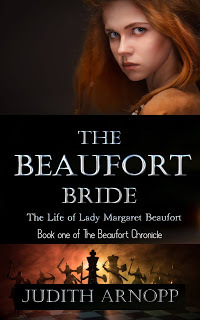 mybook.to/thebeaufortbride
mybook.to/thebeaufortbride In the following excerpt from The Beaufort Bride,Margaret is six months pregnant and has just had word that her husband has been imprisoned in Carmarthen castle and likely to die of pestilence. She persuades Jasper to take her to him.
***
Another long road. Another jolting, disheartening journey in the litter. Try as I might to persuade him, Jasper is unbending.
“You will ride in the litter or not at all,” he says, attempting to soften his harsh words with a quick smile. Pouting like an unruly child, I gather my cloak about me and clamber into the detested conveyance. I sit bolt upright, simmering with anger for as long as I can bear to. Myfanwy, moonstruck by Jasper’s return, smiles an apology for my behaviour and tries to soothe me.
“The journey will not be so long this time,” she says, “and Jasper is only thinking of your safety, and that of the babe.” She nods toward the dome of my belly and instinctively I put a hand on it, the contact imperceptibly softening my mood.
“I know.” Full of resentment, I look out beyond the looped-back curtain. Mercifully the weather is dry; a chilly bright day, with the sun reflecting on the puddles left by the last few weeks of rain. The blue skies are a teasing reminder of the summer so recently departed. Tomorrow, it will rain again.
Jasper rides at the head of the column. I watch his upright figure, notice how his head continually moves from left to right as he scans the horizon for signs of trouble. He is uneasy, not convinced of York’s promise of safe passage, and his discomfort unnerves me too.
Where the terrain allows, we follow the serpentine trail of the River Tywi, but every so often, to avoid marshy terrain, we are forced to higher ground. As we pass close to Grey Friars, the waterlogged fields about the river are scattered with sheep. At our approach, they throw up their heads in alarm and abandon their grazing to hurry from our path. Myfanwy laughs.
“Look at them. They look like beggars with their grubby woollen fleeces hanging from their backs.”
I smile, but I do not care about sheep. In the distance, I have spied the town gate and beyond it the towers of Carmarthen Castle standing proudly above a loop at the river crossing.
I sit up straighter and try to see ahead, as if expecting Edmund to be waving a greeting from the battlement. But he does not know I am coming; I will be the last person he expects to see.
I watch Jasper ride toward the town gate. He leans from his saddle and exchanges words with the gatekeeper. He takes off his helmet and turns toward me, the wind tussling his hair which, I notice with a sudden pang, is the exact same shade as Edmund’s. His brow is creased and, noting his dour expression, I sense more trouble. My heart sinks as, after a further exchange of words, he turns his horse and rides back to the litter.
He slides from his horse.
“Margaret …” He hesitates, pulls a face and lets out a long breath. “There is pestilence here. I cannot let you travel farther. It isn’t safe.”
A surge of anger such as I have never known consumes me; I can feel it rushing uncontrollably through my body, gathering in my head until I feel it will burst.
“I will not be kept from him!” I hear myself shout. Tears of rage drench my cheeks; my fists are clenched tight, my ears ringing with the sudden stress. My mother would be furious if she witnessed such behaviour, but I am too afraid and too angry to care. Without ceasing my tirade, I swing my legs toward the door.
“I have travelled too far and waited too long to be kept away now. If there is pestilence here, he may need nursing. I will not allow you to keep me from my duty.”
I struggle from the litter and, shrugging Myfanwy’s hand from my shoulder, begin to hurry along the dirt track, determined to travel the rest of the way on foot. I do not get far before my ankle turns on a rut in the road. Concealing the sudden sharp pain, I limp on.
“Margaret!” Jasper, defying all etiquette, strides after me, grabs my arm and forces me to stop. “You are acting like a child. Get back in the litter. I will take you as far as Grey Friars, but there you must wait until I discover the situation at the castle. If it is safe, you can see Edmund tomorrow. For Christ’s sake, think of your son.”
I am always being told to think of my child. I think of little else. I am thinking of him now, in my desperation to liberate Edmund. What will my son be without his father?
Myfanwy adds her argument to Jasper’s, her voice soft and silky with persuasion.
“We can freshen up and rest at the priory. You will feel better tomorrow, my lady, after a night’s sleep. Edmund will prefer to see you calm and … clean.” She casts a glance at my mired skirts.
I pass a hand over my face, knowing I am beaten, knowing they are right. With a sob of both rage and misery, I allow myself to be turned around and bundled back into the hateful litter.
As the horses lurch forward and the swaying of the litter starts up again, I refuse to look at Myfanwy. I resent her alliance with Jasper. Despite my situation, I do not miss the warm looks that pass between them, or the excuses she finds to be with him. She is glad this mischance has befallen my husband because it puts her in the company of her sweetheart.
Another religious house, this time run by the Grey Friars. They greet me cordially, offer what comfort they can and give me lodging in the abbot’s house. The room is comfortable, well furnished, and a welcome fire roars in the grate. Fuelled with resentment toward her, I cruelly send Myfanwy from my presence. It is midnight before I regret it. I pass a lonely, miserable night but I am too stubborn to summon her back, and so I lie awake, staring into the dark.
The child is quiet, his head pressing on my bladder, so I have to get up repeatedly to use the close-stool. Each time I return to the bed, the sheets become rucked into a worse mess and by dawn the blankets look as though a wrestling match has taken place.
“Goodness,” Myfanwy exclaims in the morning when she brings me a tray of victuals to break my fast. “What have you been doing?”
She bears no malice for my hostility the night before and her cheeks are rosy, her eyes bright as if she has passed a restful night. While I stare grumpily at my morning meal, she begins to smooth the sheet and plump my pillows.
“Jasper will be leaving soon, I expect.” She moves to the window and opens the shutters, letting a stream of dirty daylight into the room.
I want to correct her, command her to use his proper title but I am tired, sick and tired of everything and cannot find the strength. I frown at the hump of my raised knees beneath the blanket. There must be something I can do, some action I can take.
I push away the tray and throw off the covers. “Help me get dressed, Myfanwy. I cannot face food this morning.”
Cup in hand, she hovers for a few moments before hurrying to do my bidding. I am mute during my toilette, but all the while she sponges my face her questions fall as swiftly as arrows.
“Why are you in such a hurry? What are you going to do? You don’t mean to defy Jasper, do you, Margaret? Please don’t do anything …”
“Give me that.” I snatch the comb rudely from her hand and begin to drag it through my hair. It catches at the knots, large clumps coming free. “There,” I say. “Now quickly braid it and tuck it under my cap.”
She has no option but to obey me, and I offer no explanation. Ten minutes later, less neat than usual, I am waiting for Jasper to appear in the hall. I hear his approach long before he arrives.
“Margaret.” He stops short, instantly wary as he notices my outdoor clothes and my mulish expression. He tucks his helmet defensively beneath his arm. “What are you doing here?”
I can tell by his voice that he knows my intention, but I raise my chin defiantly before I make an answer.
“I am coming with you. I will not be sent to my chambers like a child. My husband’s life may be in peril and I refuse to sit idly by when it is clearly my duty to be with him.”
“It is too dangerous.” He comes closer, his brow creased with concern. “I have no idea what danger we may be riding into. Do you not care about your child or your own well-being?”
“Of course I do.” I look him firmly in the eye. “I have spent most of the night in prayer asking for God’s guidance as to what I should do. He convinces me my place is at Edmund’s side. Surely, Jasper, you are not so high and mighty as to argue with God?”
Exasperated, he looks at the ceiling, and then back at me.
“By Heaven, Margaret, you could use a spanking.”
I stiffen, outraged at his discourtesy, but as I open my mouth to make a sharp retort, I think I detect a tiny spark of admiration in his eye. I close my mouth again and make no reply as I pull on my gauntlets.
“And I am not spending another moment in that litter. Have a horse made ready for me.” I speak over his shoulder to his steward, but Jasper puts up a hand.
“No, if I have any say in the matter, you will ride with me, my lady, so I can at least try to keep you from harm.”
As he ushers me from the room Ned steps forward, seemingly from nowhere. “My lady, I am coming too.”
A sigh shudders from deep within me. I do not even turn to look him in the eye.
“Don’t be tiresome, Ned. Go and walk Jay in the gardens, make yourself useful.”
I turn again but he tags after me.
“Begging your pardon, my lady, but I owe you my life, and if you are going into danger then I am coming with you.” He puts his hand on the dog’s head. “And so is Jay.”
“Oh, for Heaven’s sake, you impossible child. Very well, do as you wish. I revoke all responsibility for you.”
There is no time to argue. I march swiftly away, Jasper at my side telling me I am too soft with the boy. I raise my eyebrows but forebear to comment that he might likewise be too soft with me.
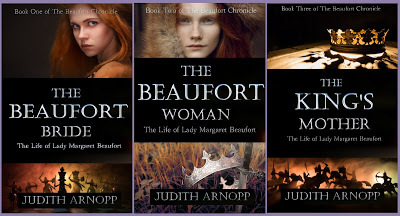 The Beaufort Chronicle is available on Kindle, Paperback and also on Audible
The Beaufort Chronicle is available on Kindle, Paperback and also on Audible

